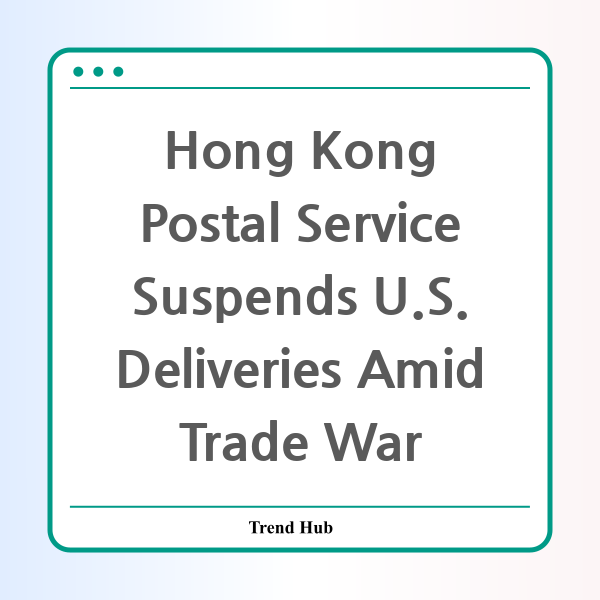* This website participates in the Amazon Affiliate Program and earns from qualifying purchases.

As trade tensions between the United States and China continue to escalate, Hong Kong’s postal service has made a significant decision that impacts international shipping. Have you heard about the recent suspension of package deliveries to the U.S.? This bold move is a direct response to the new tariffs introduced by the U.S. government, and it could have far-reaching implications for businesses and consumers in both regions.
On Wednesday, Hong Kong's government announced that Hongkong Post will cease handling packages sent to and from the United States. This suspension comes in light of President Donald Trump’s recent decision to eliminate the de minimis exemption, which previously allowed small-value parcels valued at $800 or less to enter the U.S. without incurring tariffs. The government of Hong Kong called the U.S. actions "unreasonable" and accused it of "bullying and imposing tariffs abusively."
Effective immediately, Hongkong Post will stop accepting sea freight packages and will stop taking airborne packages starting from April 27. While this does not affect postal items containing only documents, the measure indicates a significant change in the way Hong Kong conducts its postal services and could lead to increased costs for consumers and businesses alike. The government warned that residents should be prepared for exorbitant fees as they will likely need to rely on private couriers such as FedEx and DHL to ship items to the U.S.
This situation demonstrates how deeply intertwined trade relations are between these global economic players. Previously, Hong Kong enjoyed a unique trade status with the U.S., allowing it to maintain a separate customs process from mainland China. However, the revocation of this status in 2020 due to growing concerns over human rights issues in Hong Kong has resulted in increased tariffs that now align more closely with those imposed on mainland China, at rates as high as 145%.
In response to the new tariffs, Hong Kong’s Chief Executive John Lee expressed strong resistance, indicating that the city plans to file a complaint with the World Trade Organization. He criticized the U.S. for using trade as a weapon and portraying its actions as self-serving hegemony. The Chinese government has echoed these sentiments, already filing its own complaint regarding the tariffs imposed by the U.S. on Hong Kong.
The ongoing trade war raises serious concerns about the future of international shipping and trade relations, especially for small businesses that rely on smooth logistics for cross-border commerce. Shipping costs are expected to rise, and many companies may have to rethink their supply chain strategies to accommodate these new realities.
As the global economy faces these challenges, it remains essential for individuals and businesses to stay informed about evolving trade policies and their potential impacts. Navigating this new landscape will require adaptability and strategic planning to mitigate the effects of tariffs and increased shipping costs.
The suspension of the postal service to the U.S. is not just a logistical hurdle; it represents the complexities and challenges of international relations today. Interested in learning more about how these changes affect global trade or how to prepare your business for similar disruptions? Stay tuned for our upcoming articles that dive deep into the evolving world of trade and logistics.
* This website participates in the Amazon Affiliate Program and earns from qualifying purchases.